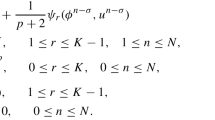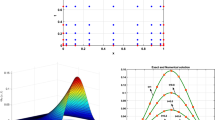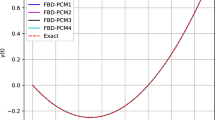Abstract
The reduced-order finite element method (FEM) based on a proper orthogonal decomposition (POD) theory is applied to the time fractional Tricomi-type equation. The present method is an improvement on the general FEM. It can significantly save memory space and effectively relieve the computing load due to its reconstruction of POD basis functions. Furthermore, the reduced-order finite element (FE) scheme is shown to be unconditionally stable, and error estimation is derived in detail. Two numerical examples are presented to show the feasibility and effectiveness of the method for time fractional differential equations (FDEs).
Similar content being viewed by others
References
Podlubny, I. Fractional Differential Equations, Academic Press, New York (1999)
Liu, F., Anh, V., Turner, I., and Zhang, P. Time fractional advection dispersion equation. Journal of Applied Mathematics and Computing, 13(1), 233–245 (2003)
Yuste, S. B. and Acedo, L. An explicit finite difference method and a new von Numann-type stability analysis for fractional diffusion equation. SIAM Journal on Numerical Analysis, 42(5), 1862–1874 (2005)
Lin, Y. M. and Xu, C. J. Finite difference/spectral approximations for the time-fractional diffusion equation. Journal of Computational Physics, 225(2), 1533–1552 (2007)
Ervin, V. J. and Roop, J. P. Variational formulation for the stationary fractional advection dispersion equation. Numerical Methods for Partial Differential Equations, 22(3), 558–576 (2006)
Zhang, H., Liu, F., and Anh, V. Galerkin finite element approximations of symmetric spacefractional partial differnetial equations. Applied Mathematics and Computation, 217(6), 2534–2545 (2010)
Li, C. P., Zhao, Z. G., and Chen, Y. Q. Numerical approximation of nonlinear fractional differential equations with subdiffusion and superdiffusion. Computers and Mathematics with Applications, 62(3), 855–875 (2011)
Ford, N. J., Xiao, J. Y., and Yan, Y. B. A finite element method for time fractional partial differential equations. Fractional Calculus and Applied Analysis, 14(3), 454–474 (2011)
Zhang, X. D., Huang, P. Z., Feng, X. L., and Wei, L. L. Finite element method for two-dimensional time-fractional Tricomi-type equations. Numerical Methods for Partial Differential Equations, 29(4), 1081–1096 (2013)
Deng, W. H. Short memory principle and a predictor-corrector approach for fractional differential equations. Journal of Computational and Applied Mathematics, 206(1), 174–188 (2007)
Ford, N. J. and Simpson, A. C. The numerical solution of fractional differential equations: speed versus accuracy. Numerical Algorithms, 26(4), 333–346 (2001)
Holmes, P. J., Lumley, L., and Berkooz, G. Turbulence, Coherent Structures, Dynamical Systems and Symmetry, Cambridge University Press, Cambridge (1996)
Jolliffe, I. T. Principal Component Analysis, Springer-Verlag, Berlin (2002)
Fukunaga, K. Introduction to Statistical Pattern Recognition, Academic Press, New York (1990)
Kunisch, K. and Volkwein, S. Galerkin proper orthogonal decomposition methods for parabolic problems. Numerische Mathematik, 90(1), 117–148 (2001)
Kunisch, K. and Volkwein, S. Galerkin proper orthogonal decomposition methods for a general equation in fluid dynamics. SIAM Journal on Numerical Analysis, 40(2), 492–515 (2002)
Sun, P., Luo, Z. D., and Zhou, Y. J. Some reduced finite difference schemes based on a proper orthogonal decomposition technique for parabolic equations. Applied Numerical Mathematics, 60, 154–164 (2010)
Luo, Z. D., Chen, J., Sun, P., and Yang, X. Z. Finite element formulation based on proper orthogonal decomposition for parabolic equations. Science in China Series A: Mathematics, 52(3), 585–596 (2009)
Luo, Z. D., Li, H., Zhou, Y. J., and Huang, X. M. A reduced-order FVE formulation based on POD method and error analysis for two-dimensional viscoelastic problem. Journal of Mathematical Analysis and Applications, 385(1), 310–321 (2012)
Luo, Z. D. A reduced-order SMFVE extrapolation algorithm based on POD technique and CN method for the non-stationary Navier-Stokes equations. Discrete and Continuous Dynamical Systems Series B, 20(4), 1189–1212 (2015)
Liu, J. C., Li, H., Fang, Z. C., and Liu, Y. Application of low-dimensional finite element method to fractional diffusion equation. International Journal of Modeling, Simulation, and Scientific Computing, 5(4), 1450022 (2014)
Adams, R. A. Sobolev Spaces, Academic Press, New York (1975)
Thomée, V. Galerkin Finite Element Methods for Parabolic Problems, Springer-Verlag, Berlin (1997)
Author information
Authors and Affiliations
Corresponding author
Additional information
Project supported by the National Natural Science Foundation of China (Nos. 11361035 and 11301258) and the Natural Science Foundation of Inner Mongolia (Nos. 2012MS0106 and 2012MS0108)
Rights and permissions
About this article
Cite this article
Liu, J., Li, H., Liu, Y. et al. Reduced-order finite element method based on POD for fractional Tricomi-type equation. Appl. Math. Mech.-Engl. Ed. 37, 647–658 (2016). https://doi.org/10.1007/s10483-016-2078-8
Received:
Revised:
Published:
Issue Date:
DOI: https://doi.org/10.1007/s10483-016-2078-8
Key words
- reduced-order finite element method (FEM)
- proper orthogonal decomposition (POD)
- fractional Tricomi-type equation
- unconditionally stable
- error estimate




